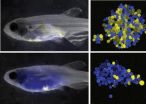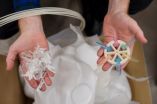(Press-News.org) Harvard stem cell scientists have identified a mutation in human cases of acute lymphoblastic leukemia that likely drives relapse. The research, published in Cancer Cell, could translate into improved patient care strategies for this particular blood cancer, which typically affects children but is more deadly in adults.
In recent years, a trend toward single-cell analysis has shown that individual cells within a tumor are capable of amassing mutations to make them more aggressive and treatment resistant. So while 99% of a tumor may be destroyed by the initial treatment, a particularly aggressive cell can survive and then cause a cancer patient with the "all clear" to relapse six months later.
Harvard Stem Cell Institute Principal Faculty member David Langenau, PhD, and his lab members in the Department of Pathology at Massachusetts General Hospital used zebrafish to search for these rare, relapse-driving leukemia cells and then designed therapies that could kill these cells.
The researchers found that at least half of relapse-driving leukemic cells had a mutation that activated the Akt pathway, which rendered cells resistant to common chemotherapy and increased growth. From that insight, Langenau's lab next examined human acute lymphoblastic leukemia and discovered that inhibition of the Akt pathway restored leukemic cell responses to front-line chemotherapy.
"The Akt pathway appears to be a major driver of treatment resistance," Langenau said. "We also show that this same pathway increases overall growth of leukemic cells and increases the fraction of cells capable of driving relapse."
Jessica Blackburn, PhD, the study's first author adds, "Our work will likely help in identifying patients that are prone to relapse and would benefit from co-treatment with inhibitors of the Akt pathway and typical front-line cancer therapy."
In addition to determining how best to translate this finding into the clinic, Langenau hopes to to identify other mutations that lead to relapse. The work should identify a host of other potential drug targets for patients with aggressive leukemia.
The research took five-and-a-half years to complete, and has its origins as one of the first projects Langenau took on when he started his laboratory. The study was also the most labor-intensive project his lab members took on, with over 6,000 zebrafish transplant experiments.
INFORMATION: END
Common mutation is culprit in acute leukemia relapse
Finding in zebrafish may be clinically relevant for humans
2014-03-06
ELSE PRESS RELEASES FROM THIS DATE:
Warming temperatures are pushing 2 chickadee species -- and their hybrids -- northward
2014-03-06
The zone of overlap between two popular, closely related backyard birds is moving northward at a rate that matches warming winter temperatures, according to a study by researchers from the Cornell Lab of Ornithology, Villanova University, and Cornell University. The research will be published online in Current Biology on Thursday, March 6, 2014.
In a narrow strip that runs across the eastern U.S., Carolina Chickadees from the south meet and interbreed with Black-capped Chickadees from the north. The new study finds that this hybrid zone has moved northward at a rate ...
Obese adolescents not getting enough sleep?
2014-03-06
Cincinnati, OH, March 6, 2014 -- Lack of sleep and obesity have been associated with an increased risk of cardiovascular and metabolic diseases in adults and young children. However, the association is not as clear in adolescents, an age group that is known to lack adequate sleep and have an overweight and obesity prevalence rate of 30% in the US. In a new study scheduled for publication in The Journal of Pediatrics, researchers found that cardiometabolic risk in obese adolescents may be predicted by typical sleep patterns.
Heidi B. IglayReger, PhD, and colleagues from ...
Establishing standards where none exist; Harvard researchers define 'good' stem cells
2014-03-06
After more than a decade of incremental – and paradigm shifting, advances in stem cell biology, almost anyone with a basic understanding of life sciences knows that stem cells are the basic form of cell from which all specialized cells, and eventually organs and body parts, derive.
But what makes a "good" stem cell, one that can reliably be used in drug development, and for disease study? Researchers have made enormous strides in understanding the process of cellular reprogramming, and how and why stem cells commit to becoming various types of adult cells. But until now, ...
Dr. Brenna Anderson contributes to expert series on GAS in pregnancy
2014-03-06
Ignaz Semmelweiss made one of the most important contributions to modern medicine when he instituted hand washing in an obstetric clinic in Austria in 1847, decreasing mortality there from more than ten percent to two percent. Unfortunately, infections can still occur in pregnancy and during delivery and can have associated mortality rates of up to 30 to 50 percent if not treated quickly and properly.
Brenna Anderson, MD, director of the Women's Infectious Diseases Consultative Service at Women & Infants of Rhode Island and an associate professor of obstetrics and gynecology ...
Study identifies gene important to breast development and breast cancer
2014-03-06
Significance: Understanding more about how the different types of cells in breast tissue develop improves our knowledge of breast cancer. TAZ represents a potential new target for drug therapies to treat aggressive types of breast cancer.
Background: In cancer, normal cells can become unpredictable or aggressive and thus difficult to treat with anti-cancer drugs. This is especially true in breast cancer. By identifying the genes responsible for this change in cells from breast tissue, researchers hope to identify a way to stop or reverse it.
In breast tissue, there ...
Are you smarter than a 5-year-old? Preschoolers can do algebra
2014-03-06
Millions of high school and college algebra students are united in a shared agony over solving for x and y, and for those to whom the answers don't come easily, it gets worse: Most preschoolers and kindergarteners can do some algebra before even entering a math class.
In a recently published study in the journal Developmental Science, lead author and post-doctoral fellow Melissa Kibbe and Lisa Feigenson, associate professor of psychological and brain sciences at Johns Hopkins University's Krieger School of Arts and Sciences, find that most preschoolers and kindergarteners, ...
Access to social workers could keep veterans out of criminal justice system, MU researchers find
2014-03-06
COLUMBIA, Mo. –Approximately one in six veterans struggles with substance abuse, and 20 percent show signs of mental health issues or cognitive impairments, previous research has shown. These risk factors, combined with a lack of resources, could be contributing to an increase of veterans entering the criminal justice system, according to a report by the Center for Mental Health Services. Now, University of Missouri researchers have investigated ways social workers can address veterans' needs and keep them out of jail.
"Social workers are equipped to provide support to ...
Save money and the planet: Turn your old milk jugs into 3-D printer filament
2014-03-06
Making your own stuff with a 3D printer is vastly cheaper than what you'd pay for manufactured goods, even factoring in the cost of buying the plastic filament.
Yet, you can drive the cost down even more by making your own filament from old milk jugs. And, while you are patting yourself on the back for saving 99 cents on the dollar, there's a bonus: you can feel warm and fuzzy about preserving the environment.
A study led by Joshua Pearce of Michigan Technological University has shown that making your own plastic 3D printer filament from milk jugs uses less energy—often ...
First-ever 3-D image created of the structure beneath Sierra Negra volcano
2014-03-06
The Galápagos Islands are home to some of the most active volcanoes in the world, with more than 50 eruptions in the last 200 years. Yet until recently, scientists knew far more about the history of finches, tortoises, and iguanas than of the volcanoes on which these unusual fauna had evolved.
Now research out of the University of Rochester is providing a better picture of the subterranean plumbing system that feeds the Galápagos volcanoes, as well as a major difference with another Pacific Island chain—the Hawaiian Islands. The findings have been published in the Journal ...
Sickle cell trait: Neglected opportunities in the era of genomic medicine
2014-03-06
(Boston)--While acknowledging the potential of genomics to prevent and treat disease, researchers from Boston Medical Center (BMC) and Boston University School of Medicine (BUSM) believe it is long past due to use current scientific data and technical advances to reduce the burden of sickle cell disease (SCD), one of the most common serious single gene disorders. The work, reported as a Viewpoint in this week's Journal of the American Medical Association (JAMA), highlights the gaps in knowledge and care in terms of SCD and the need to address this issue expeditiously. ...
LAST 30 PRESS RELEASES:
Genetics help explain who gets the ‘telltale tingle’ from music, art and literature
Many Americans misunderstand medical aid in dying laws
Researchers publish landmark infectious disease study in ‘Science’
New NSF award supports innovative role-playing game approach to strengthening research security in academia
Kumar named to ACMA Emerging Leaders Program for 2026
AI language models could transform aquatic environmental risk assessment
New isotope tools reveal hidden pathways reshaping the global nitrogen cycle
Study reveals how antibiotic structure controls removal from water using biochar
Why chronic pain lasts longer in women: Immune cells offer clues
Toxic exposure creates epigenetic disease risk over 20 generations
More time spent on social media linked to steroid use intentions among boys and men
New study suggests a “kick it while it’s down” approach to cancer treatment could improve cure rates
Milken Institute, Ann Theodore Foundation launch new grant to support clinical trial for potential sarcoidosis treatment
New strategies boost effectiveness of CAR-NK therapy against cancer
Study: Adolescent cannabis use linked to doubling risk of psychotic and bipolar disorders
Invisible harms: drug-related deaths spike after hurricanes and tropical storms
Adolescent cannabis use and risk of psychotic, bipolar, depressive, and anxiety disorders
Anxiety, depression, and care barriers in adults with intellectual and developmental disabilities
Study: Anxiety, gloom often accompany intellectual deficits
Massage Therapy Foundation awards $300,000 research grant to the University of Denver
Gastrointestinal toxicity linked to targeted cancer therapies in the United States
Countdown to the Bial Award in Biomedicine 2025
Blood marker from dementia research could help track aging across the animal world
Birds change altitude to survive epic journeys across deserts and seas
Here's why you need a backup for the map on your phone
ACS Central Science | Researchers from Insilico Medicine and Lilly publish foundational vision for fully autonomous “Prompt-to-Drug” pharmaceutical R&D
Increasing the number of coronary interventions in patients with acute myocardial infarction does not appear to reduce death rates
Tackling uplift resistance in tall infrastructures sustainably
Novel wireless origami-inspired smart cushioning device for safer logistics
Hidden genetic mismatch, which triples the risk of a life-threatening immune attack after cord blood transplantation
[Press-News.org] Common mutation is culprit in acute leukemia relapseFinding in zebrafish may be clinically relevant for humans




